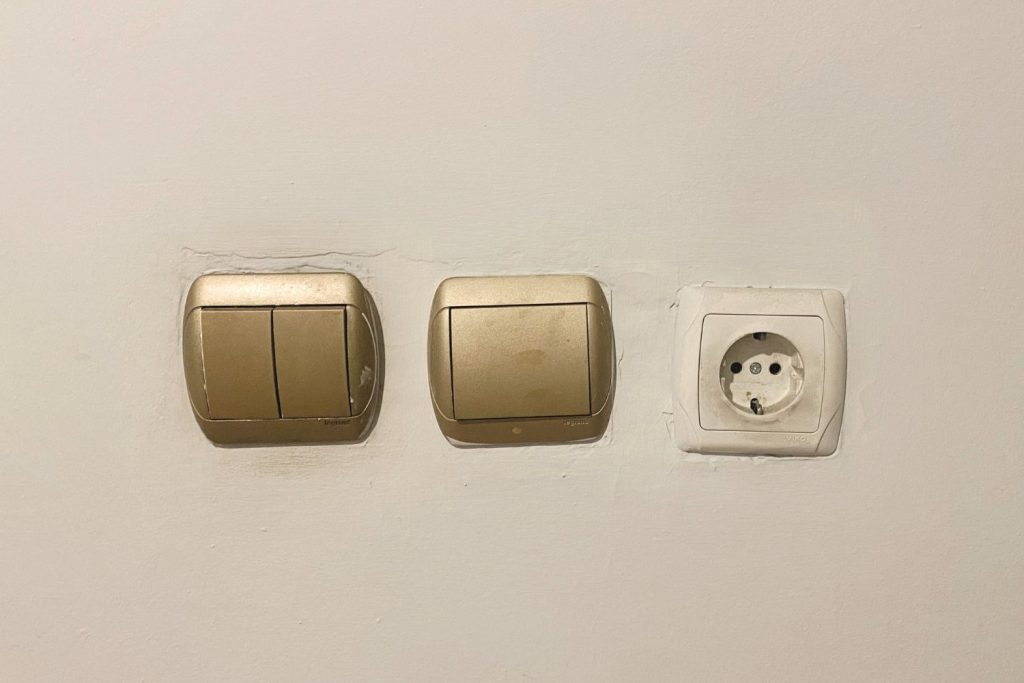sockets and Power Plugs in Turkey: A Traveler’s Essential Guide

The Art of Living in Turkey contains affiliate links and is a member of the Amazon Services LLC Associates Program. If you make a purchase using one of these Amazon links, I may receive compensation at no extra cost to you. See my Disclaimers for more information.
When traveling in Turkey, one of the most important things to consider is how to power your devices. Power plugs in Turkey are type F or type C, with two round pins, and the standard voltage is 220V at 50Hz.
Before you head out, make sure to pack the right power adapter — preferably one with a surge protector — to ensure your electronics stay powered up throughout your trip.
As any seasoned traveler knows, there’s nothing more frustrating than arriving at your destination, only to find your devices won’t charge.
I’ve been there myself and it wasn’t pretty. That’s why I invested in a universal adapter before I moved to Turkey. Since then, it’s kept me connected no matter where I go.
The electrical supply in Turkey can sometimes be a little unreliable, so having a quality adapter and, if necessary, a voltage converter is essential for a hassle-free experience. But I’ll explain when you need each.
In this guide, I’ll walk you through everything you need to know about power plugs, voltage ratings, as well as share a few tips to keep your devices safe while you travel in Turkey.
Understanding Power Plugs and Sockets in Turkey
If you’re traveling to Turkey from another country, one of the key things to consider is the wall outlet standards.
Especially you may be wondering if the Turkey power plug same as Europe and the answer would be Yes!
Turks use Type F power plugs which is a standard that’s also common across Continental Europe. This system relies on two round pins, along with a grounding pin.


You can also see Type C. It looks the same just doesn’t have the grounding pin.
The standard voltage in Turkey is 220V, and the standard frequency is 50Hz.
You’ll typically find sockets that are recessed into the wall, which means your plug will need to have plastic – not just metal – around the base of the pins.
If your country uses the same plug type and voltage range, you’re all set.
However, if your home country uses a different standard, you’ll need to be properly prepared to ensure your devices can be charged safely and efficiently.
Fun fact: Turkey uses more electricity per person than the global average. (Wikipedia)
Power Converters and a Warning on Voltage Ratings
When using electrical appliances in a foreign country, one critical factor to keep in mind is the country’s standard voltage ratings.
Turkey operates on a 220V supply voltage and 50Hz. This standard is common across many European countries, but it does differ from other regions like America for instance.
If you come from a country like the United States or Canada, your appliances are likely designed for a 110-120V electrical system and you will need to use a converter for certain appliances
The significant voltage difference may potentially damage your devices, or even worse, can increase the risk of electrical fires.
Please, note that some modern appliances are built to support a range of voltages, from as low as 100V to 240V. This feature would often be specified in the appliance’s label or manual.
It is especially important to check when it comes to things like heating pads, hair dryers, straighteners, etc.
Such devices, like most laptop chargers, usually don’t need a converter. However, please ensure you confirm your device’s particulars before plugging them in.
If your devices are not compatible with the 220V voltage, you would need a voltage converter or transformer. We strongly advise against trying to use your appliances without one, as it poses a significant risk.
If you plug in a device that has too high of voltage for the adapter, it will blow the fuse. There is usually a spare fuse inside the adapter.
Necessary Adapters
If you are traveling to Turkey from a country that does not use Type F or Type C plugs, you will need to bring a power adapter.
The most common type of adapter needed for Turkey is the Type F, which is a two-pin plug and socket with a side grounding contact.
The plug Type C, or “Europlug”, is also commonly used in Turkey. This is a two-pin plug with round pins, used across Europe.
If your device’s plug doesn’t match the shape of these sockets, you will need a travel plug adapter in order to plug in your appliances.
Keep in mind that a power adapter does not change the voltage or electrical output of the socket, it solely enables your plug to fit into the Turkey electrical outlet.
Some reliable brands for travel adapters include Skross, Bestek, and Epicka. These are robustly made, safe, and offer good compatibility with different socket types.

However, do be cautious and avoid buying cheap, non-branded travel adapters.
They may not meet safety standards and could potentially harm your devices or even pose a personal safety risk.
Specifically what I love about this Epicka adapter is that it has 4 USB and 1 Type-C outlet meaning you can charge 6 different things at once (provided it doesn’t exceed the adapter’s wattage).
Tips for Using Them Safely
Using power plugs in a foreign country can be a bit daunting, but with a little preparation and mindfulness, you can safely use your appliances while in Turkey.
Here are some tips to keep in mind:
- Always check the voltage of your appliance before using it with a plug or adapter in Turkey. Anything over 240 volts or less than 220 volts might require the use of a voltage converter or transformer, not just an adapter.
- Pack a reliable travel adapter before your trip, especially one that complies with the Turkish standard (Type F or C).
- Remember to unplug all appliances when they are not in use. This can not only reduce the chances of overheating and potential fire hazards but also save energy.
- Check the condition of the power sockets and plugs before use. Any signs of damage such as exposed wiring, burn marks, or cracks should be reported immediately and the plug should not be used.
- Do not force a plug into a socket if it doesn’t fit properly. Using force can potentially damage both the appliance and the socket and may even lead to electrical hazards.
- Beware of multiple extension cords. It is quite common practice to connect multiple extension cords as there is usually just one outlet in a room. This is not the best safety practice so limit them where you can.
Abiding by these tips should help ensure a smooth and safe experience with power plugs during your visit to Turkey.

Power Plugs in Turkey FAQs
What type of power plug is used in Turkey?
The power plug type used in Turkey is Type F and Type C, similar to many European countries. Both sockets and plugs are rounded and have two circular pins for phase and neutral, and two grounding clips on the socket (Type F), not on the plug. Type C is similar but doesn’t have the grounding pin.
What are the voltage and frequency in Turkey?
In Turkey, the standard voltage is 220 V and the frequency is 50 Hz. It’s important to ensure your appliances are compatible with these ratings to avoid potential damages or malfunctions. If it is different, use a converter.
What type of adapter do I need in Turkey?
If you are traveling from a country that does not use Type C or F plugs, you will need a travel adapter for your devices. Ensure the adapter you choose is rated for your appliance’s power requirements and voltage.
What safety considerations should be taken when using power plugs in Turkey?
When using power plugs in Turkey, it’s necessary to ensure that the plug is fully inserted into the socket before turning on the appliance. You should also avoid overloading sockets or using appliances with damaged cords, as these can pose safety risks.
Final thoughts on The Importance of Adapters and Converters
We all know that in today’s world being connected to power is super important. Whether it means drying your hair or keeping your phone charged.
I hope that this in-depth look at Type C and Type F outlets as well as voltage in Türkiye has been helpful.
Here are a few reminders as you go:
- Turkey uses Type C and Type F outlet styles.
- It’s essential to be aware of the voltage ratings of your appliances since Turkey might have different voltages compared to your home country, potentially leading to damage or malfunctions if not properly considered.
- Travelers need to be equipped with the necessary adapters depending on their country of origin to ensure the smooth operation of their devices. Recommended adapter brands have been suggested for reliability and safety.
- Familiarizing oneself with the safety precautions when using power plugs in Turkey could save you from potential hazards or damage to your appliances.
With this knowledge, visitors will be better equipped to handle their electronic needs while in Turkey, ensuring a more comfortable and hassle-free stay.
Read More:
- Considering living in Istanbul or Turkey? Read this!
- If you’re gonna rent a car make sure you read more
- Check out some of the best gifts you can bring back to friends and family
- Wanna teach English abroad?
Turkey Vacation Basics
When I plan a trip these are the websites I use. I hope they help you plan your next adventure as well!
FLIGHTS: I am a huge fan of Skyscanner and WayAway.
VISAS: You can use the free e-visa portal here but for a few extra dollars you can use iVisa and someone else will handle any issues that may come up.
E-SIM: When I traveled to SE Asia I discovered e-sims and I’m never going back. Airalo has been easy and cheap!
TRAVEL INSURANCE: I use TravelInsurance.com for my trips abroad.
CAR RENTAL: I have loved working with Discover Cars when I rent cars in country.
AIRPORT TRANSFERS: I have used these transfers many times and they are always great. If you’d like more options, I also recommend GetTransfers.com as they allow you to compare companies.
ACCOMMODATION: Find the best Turkey hotel deals on Booking.com.
CITY TOURS & DAY TRIPS: You can browse GetYourGuide’s website to find just the tour you’re looking for! We also recommend the MegaPass for major cities.


